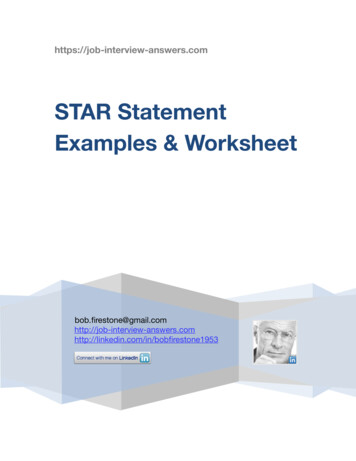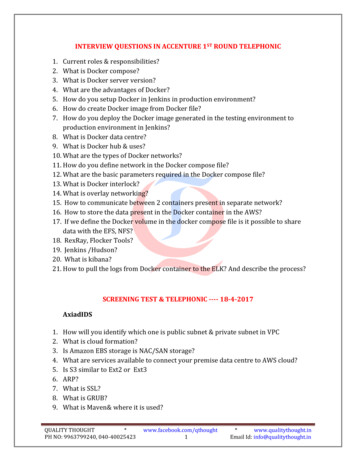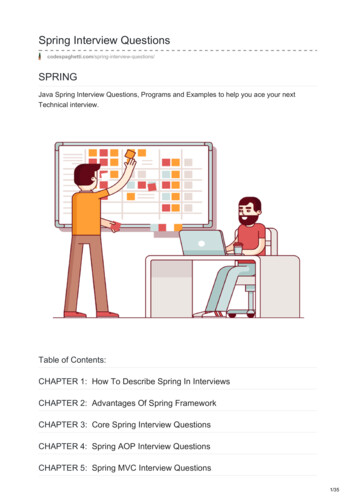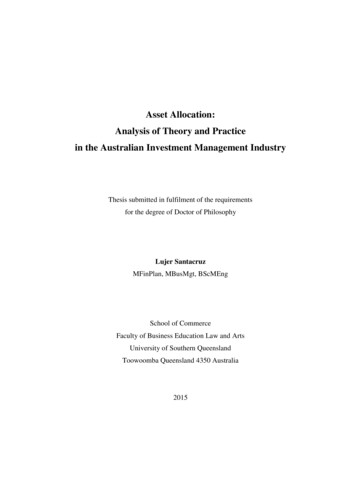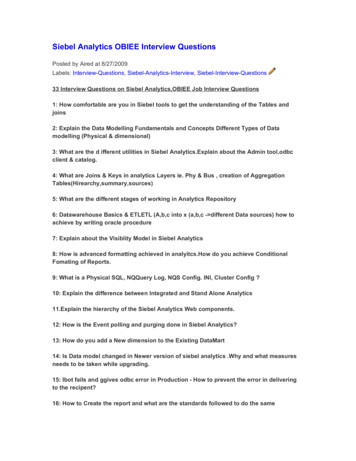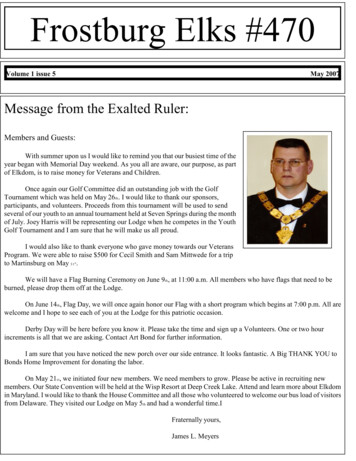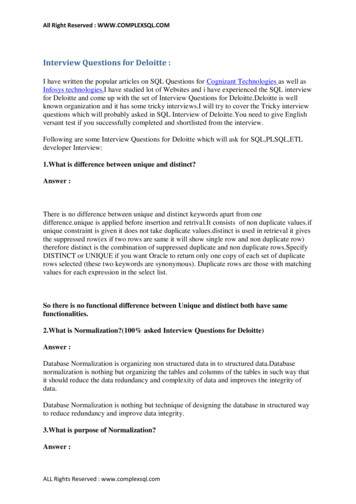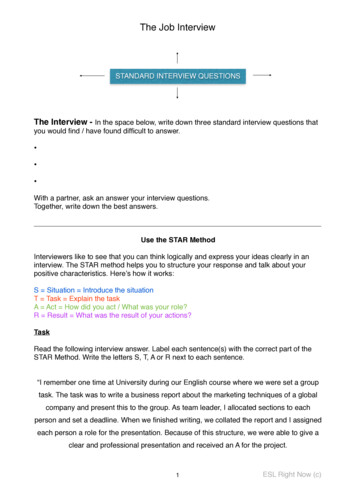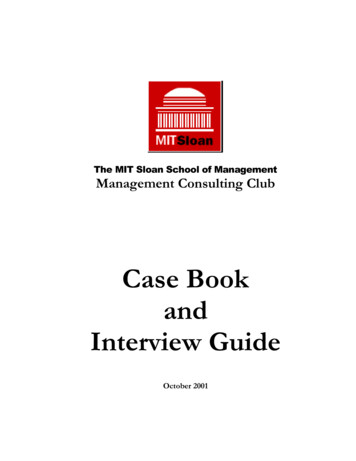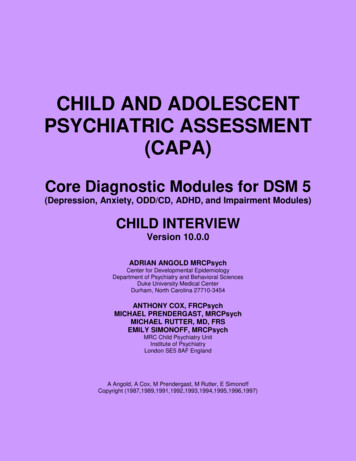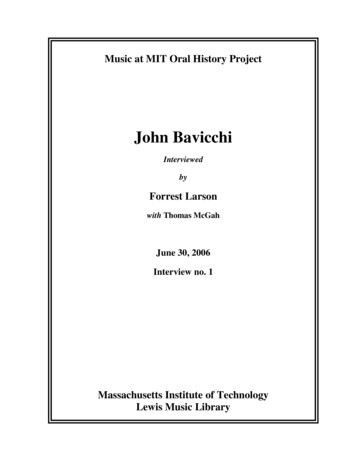
Transcription
Music at MIT Oral History ProjectJohn BavicchiInterviewedbyForrest Larsonwith Thomas McGahJune 30, 2006Interview no. 1Massachusetts Institute of TechnologyLewis Music Library
Transcribed by: University of Connecticut, Center forOral History, Tapescribe, from the audio recordingTranscript Proof Reader: Lois Beattie, Jennifer PetersonTranscript Editor: Forrest Larson 2012 Massachusetts Institute of TechnologyLewis Music Library, Cambridge, MAii
Table of Contents1. Berklee Department and early musical background (00:00—CD1 00:00) .1Berklee College of Music Classical Music Dept. —classical and non-classical curriculum—first generation American-Italian parents—father, Alexander Bavicchi, cellist—trombonestudy with Robert W. Gibb, Dedham H.S. orchestra director—Tchaikovsky’s Symphony no.4—early compositions—George A. Wedge & harmony2. Attending MIT (13:07—CD1 13:07) .6Family legacy of contracting—music at MIT in the 1940s—Naval College TrainingProgram—MIT Combined Musical Clubs—MIT Glee Club, under Henry Jackson Warren—ROTC band—Apollo Club in Boston, MA3. Naval service in World War II and engineering employment (32:04—CD1 32:04) .13Study at Newark College of Engineering Civil and Cornell University—Civil EngineeringCorps—interest in Okinawan culture—Grossier and Schlager Iron Works, Somerville, MA4. College music study and beginning of musical career (36:13—CD1 36:13) .15GI Bill—New England Conservatory—Carl McKinley—Francis Judd Cooke—OliverMessiaen—Irving Fine—composing for clarinet—Ronald White, San Antonio Symphony—Felix Viscuglia, Boston Symphony—Roger Voisin, Boston Symphony—Rosario Mazzeo atNEC—early compositions5. Studies with Walter Piston (48:29—CD1 48:29) .18Harvard University musicology graduate program— studies with Walter Piston—BostonSymphony—Serge Koussevitzky—Louis Speyer—Archibald T. Davison—Otto Gambosi—JohnWard—choral literature studies with Archibald Davison —Canton Choral Society— JohnMoriarty—conducting studies with Francis Findley at NEC—Renaissance repertoire and rebarring medieval music—Béla Bartók’s use of classical form—recordings of Barkók’sConcerto for Orchestra6. European tour with Giuliana Chorale & returning to Harvard (59:19–CD1 59:19) .23Director Paul Giuliana— Nadia Boulanger—Walter Piston & Arnold Schoenberg—Piston’sThe Incredible Flutist—Boaz Pillar, bassoonist—MITSO performance with BostonConservatory dancers Jan Veen and Ruth Ambrose—Piston & the twelve-tone technique—Bavicchi’s ASCAP sponsorship by Irving Fine—Harvard graduate degree candidacy7. Composing and teaching in the twentieth century (1:15:18–CD2 03:49) .30Arthur Farwell—modernist composers—American Symphony Orchestra LeagueConvention—Peter Mennin—William Schumann—Vincent Persichetti—Rivers Country DaySchool, Weston, MA—Brookline Music School—meeting John Corley—Festival Symphony,op. 51—Felix Viscuglia—interviewing Dmitry Kabalevsky for Harvard radio station WHRB—Richard Bobbitt & Robert Share—teaching at Berklee with William Maloof8. John Corley, MIT Concert Band Conductor, trumpeter, friend, & colleague(1:30:39–CD2 19:10) .35John Corley’s favorite compositions pieces by Thomas McGah, Silvia San Miguel, AlainCaron—opinion of Corley’s trumpet playing—Corley as an advocate for contemporarycomposersNote on timing notations: Recording of this interview can be found either as onecontinuous file or as split up over two audio CDs. Timings are designated in chapterheadings in both formats, with the timing on the full file preceding the timing on the CDversion.iii
ContributorsJohn Bavicchi (b. 1922), composer, conductor has taught at the Berklee College ofMusic since 1964, where he is now Professor Emeritus. He attended MIT 1940-1942,enrolled in course XV (business and engineering), and sang in the MIT Glee Club.After a brief engineering career, he studied composition with Carl McKinley, FrancisJudd Cooke and Walter Piston. His output includes orchestral, choral, piano andchamber music, and concert band music, written for John Corley (director of the MITConcert Band, 1949–1999). He has been an active conductor, notably directing theArlington-Belmont Chorale for 44 years.Thomas J. McGah (b. 1938) is a composer and has been professor of music at theBerklee College of Music since 1973. His music includes works for orchestra, concertband, as well as vocal and chamber music.Forrest Larson, Library Assistant at the Lewis Music Library, has attended trainingworkshops in oral history methodology and practice at Simmons College and by theSociety of American Archivists, and is a member of the Oral History Association. Heis also an active composer and violist.Interview conducted by Forrest Larson on June 30, 2006, in the MIT Lewis MusicLibrary. Duration of the audio recording is 1:42:49. First of two interviews. Secondinterview: September 1, 2006.Music at MIT Oral History ProjectThe Lewis Music Library’s Music at MIT Oral History Project was established in1999 to document the history of music at MIT. For over 100 years, music has been avibrant part of the culture at the Massachusetts Institute of Technology. This historycovers a wide variety of genres, including orchestral, chamber, and choral musicalgroups, as well as jazz, musical theater, popular and world music. Establishment of aformal music program in 1947 met the growing needs for professional leadership inmany of the performing groups. Shortly thereafter, an academic course curriculumwithin the Division of Humanities was created. Over the years, the music faculty andalumni have included many distinguished performers, composers, and scholars.Through in-depth recorded audio interviews with current and retired MIT musicfaculty, staff, former students, and visiting artists, the Music at MIT Oral HistoryProject is preserving this valuable legacy for the historical record. These individualsprovide a wealth of information about MIT. Furthermore, their professional lives andactivities are often historically important to the world at large. Audio recordings ofall interviews are available in the MIT Lewis Music Library.iv
1. Berklee Department early musical background (00:00—CD1 00:00)FORREST LARSON: It’s my honor and privilege to have John Bavicchi for an interview thismorning. It’s June 30th, 2006. Also here in the studio is Thomas McGah. John is Professorof Music Emeritus at the Berklee College of Music [formerly Berklee School of Music,Schillinger House], and Thomas is still currently teaching at the Berklee College of Music aswell. John attended MIT from fall of 1940 to spring of 1942, enrolled in Course 15, which isBusiness and Engineering. He was later a friend and colleague of John Corley [1919–2000],who was the conductor of the MIT Concert Band from 1948 to 1999.Before we get into things, can one or both of you briefly explain how yourdepartment at Berklee, which teaches classical music composition, how it fits into a largelynon-classical curriculum?JOHN BAVICCHI: Well—the—what’s called the classical music department at Berklee is,according to many of my pupils who’ve come from Europe, one of the best kept secrets in themusical world. Many people—well, the constant—the constant question that Tom and I arealways asked—well, you know, when they find out we teach at Berklee—is that, “Oh, Ididn’t know you [laughs] taught—you taught jazz!” And, of course, my answer is: I don’teven know what jazz is, which is another question. But Berklee doesn’t stress the classicalmusic department particularly, but it’s essential if they’re going to graduate people.FL:How does the administration see that, as far as fitting into the curriculum? Or is it therebecause they’re just supposed to have it?THOMAS McGAH: Well, I think that was probably the initial impetus that caused the compositiondepartment to come into being, but it’s changed—it’s changed over the years because it—ourdepartment has attracted quite a few students. We have approximately—near eighty studentsnow who are composition majors, but then there are over three hundred film scoring majors,and they have to take all of the composition courses. In order to get the bachelor’s degreethey have to take a certain amount of what are called traditional music courses. But yeah, ithas expanded, and I believe that it is now the largest—we have the largest faculty of anymusic school in—at least in the country—JB:Well, in—I was just going to—TM:I think there are thirty—over thirty practicing composers teaching now in the compositiondepartment.FL:Wow!JB:Yeah, it’s my understanding that Berklee is now the largest independent music school in theworld.TM:Yeah. Yeah, it’s about four thousand students.JB:Yeah, not attached to a larger university.FL:Wow, that’s very interesting. Just one more thing. I was looking on—on the web and it saidthat this department was initially started in, to quote from the web, “in an effort to obtainaccreditation so that Berklee could grant music degrees.”JB:That’s correct.FL:Yeah.1
JB:When I was—when I was hired, I was the second person hired so that they could havewhat—I suppose what they call core courses [laughs], you know, harmony, counterpoint,conducting, music history—FL:Right.JB:—solfège—all of those things, which they didn’t have before because it was strictly a jazz, acommercial music school.FL:Right. Okay. So getting on with the interview more directly here. Can you talk about whereyou were born, and the date and all that?JB:Excuse me?FL:When were you born, and where?JB:I was born in Boston on April 25, 1922, which makes me an octogenarian in his fourth year.TM:[laughs]FL:So, were you born in Boston proper and you grew up in Dedham [MA]?JB:Yeah. I grew up in Dedham, but for the birth my mother was sent to the Forest HillsHospital, which is no longer in existence.FL:Okay. All right. Tell me briefly about your family, your parents’ professions and how manysiblings you have?JB:Yes. My father and mother were born in this country from—first generation from—mygrandparents came from Italy, one from the Rome area and one from the Abruzzi, and myfather was a freelance cellist in Boston.FL:Aha!JB:And, unfortunately, he had been gassed in the First World War with the chlorine gas and thatled to immediate cancer of the liver and he died at thirty-three from cancer of the liver,caused by the chlorine gas attacks in the war. And then my mother remarried one of his bestfriends.FL:Your father’s name was—?JB:Bavicchi.FL:What was his first name?JB:Alexander.FL:Alexander, okay.JB:Yeah. Alexander Bavicchi. And my mother remarried one of his closest friends, and healways maintained that he’d promised my father that he would take care of us because shehad three children, and I was the oldest, and I was seven years old when he died.FL:Your mother’s first name—?JB:Sarah.FL:Yeah, and what was her maiden name?JB:Nolfi.FL:Okay.JB:Sarah Nolfi, yeah.2
FL:Wow. Okay, you were telling me about who this—her second husband.JB:Yeah, her second husband was John Iafolla, who was in the construction business and hedid—he did very well. He was a very hard worker and—FL:Was he a contractor?JB:Contractor, yeah, built roads and bridges and anything else that people would pay him for![laughs] And I grew up in that atmosphere of the construction jobs.FL:Was he musical in any way?JB:No. No. And, as a matter of fact, my mother in her own gentle way tried to stop me frombeing musical because there was no point to it [laughs] financially, and, but I got along withmy stepfather very well and I—FL:Did he listen to music and go to concerts?JB:No, no, no. Neither one of them, yeah.FL:Uh-huh.JB:The only music they heard was music in church, which he didn’t go to, but he figured he’dbought his way into heaven anyway building parking lots. [laughs]FL and TM: [laugh]JB:And the church, you know. But my mother was really solidly religious until her last days.FL:So, how many siblings did you have?JB:Well, there were three of us by my first father and two with the second.FL:Uh-huh.JB:And we—we all get along, and we’re all still alive.FL:Any of them musical?JB:No.FL:No.JB:Well, and let’s put it this way, there is some musical talent in my sister and brother, both mysiblings from my own father, but they didn’t nurture it. My sister actually sang quite a lot inschool and college; she sang Mozart operas and stuff like that.FL:What’s her first name, your sister’s?JB:My sister, Palma.FL:Yeah.JB:P-A-L-M-A. Palma. And my brother played the trumpet about as well as I played thetrombone, maybe better. [laughs]FL:What’s his first name?JB:Ferris.FL:Uh-huh.JB:And Ferris and I played the trombone and trumpet duets for many, many years until I sold mytrombone to study the viola, and Ferris just gave up because he wanted to make money likeeverybody.3
TM:Just I—may I?FL:Yeah.TM:I’m curious about this. When did you begin taking the trombone lessons? How old wereyou?JB:Well, I took them when I was a sophomore in high school because my piano teacher—mymother insisted that I have piano lessons—FL:So you started piano first, right?JB:Yes. I was studying with a man named Robert W. Gibb [1893–1937], who was a wonderfulman, and he conducted the high school orchestra. He said, “I need trombones. Why don’tyou come play, learn trombone?” I said, “Okay.”TM:This was in Dedham, now?JB:In Dedham High School. Yeah.TM:Dedham High school. So, you started in the music education—?JB:Right, right.TM:—part of the school.JB:And he—he remained a lifelong friend, Robert W. Gibb. He used to conduct festivals aroundMassachusetts and I would go with him when he—so I’ve—between him and [John] Corley[conductor of the MIT Concert Band, 1948–1999], I’ve had a lot of experience with—have,you know, music ed festivals in Massachusetts.FL:So, how old were you when you started piano?JB:How old are you when you’re in junior high school?FL:Uh-huh.TM:Twelve, thirteen.JB:Twelve, thirteen.TM:Yeah.FL:And was it something that was just kind of expected of you to do? I mean, some—some kidsare just—JB:Yeah. It was part of the—of the—what should I say—the effect of life of—what my motherthought was of—people of where we lived, and I should study piano.FL:Yeah, yeah.JB:And as a matter of fact, the other two studied piano, too—also, I should say. And I neverwent—got to be a very good pianist. Beethoven, opus 28 [Piano Sonata no. 15 in D Major]was about as far as I ever got but I—I kept the piano long enough to be able to teach with it,but as I got more and more into conducting later, I dropped the piano completely.FL:So, was there a point in your musical experiences before college that you were evencontemplating a professional musical career?JB:Well, yes. I’d—I must say that the trombone and its limited abilities—TM:[laughs]4
JB:—got me into the world of serious music because of the Tchaikovsky Fourth Symphony[Symphony No. 4 in F Minor, op. 36], and I couldn’t believe that the trombone players couldplay like that and still be humans. [laughs]TM:[laughs]JB:I think I wore out the 78s. In those days, there were only 78 records, and I kept wearing themout and getting another set at two dollars a crack, and—which was a lot of money then. AndI began to write pieces. I wrote—my first piece was an orchestral piece and I got the bookby—Wedge? [George A. Wedge] A harmony book, I think, was—and I got an orchestrationbook by somebody, and I started writing the piece. And I looked at it, you know—I keptthem, probably still have them somewhere, although I’m not sure of that, but I think theymust be somewhere. I remember I had the trumpets building up to a climax and they got toohigh, so I put them down an octave. [laughs]TM:[laughs]JB:Of course, which absolutely ruined any climax I might have had. [laughs] I wrote aboutthirty—before I—before I called it—a piece opus 1, I wrote about thirty-eight pieces—FL:Uh-huh.JB:—and I went back and have taken some of them to use and, you know, work since then.FL:So, were these—were you working with Robert W. Gibb on these, or just kind of on yourown?JB:Well, on my own, and I’d ask him questions and he’d laugh. [laughs] I actually wrote—FL:So what—with your piano lessons with him, did he give you theory lessons as well?JB:Yes. Yes. He gave me some, well, I would say rudimentary theory lessons, and I wrote theclass song when I graduated from high school. And he harmonized it, I must say—I wrotethe tune. [laughs] But he never said that, he said that I wrote it all. He lied. [laughs]TM:[laughs]FL:[laughs] And your high school orchestra, did they play your orchestra piece?JB:Excuse me?FL:The orchestra piece that you wrote—?JB:Oh, no, no, no. [laughs]FL:You just wrote out some—yeah, yeah.JB:No, it—somehow I realized even at that age that this was a thankless task and that nobodycared! [all laugh]TM:Oh, boy.FL:So before college did you sing in choirs or take voice lessons or anything?JB:I did a lot of singing, but that came after I got to MIT—FL:Okay.JB:Because the MIT Choral Society is what got me into the world of choral music.5
2. Attending MIT (13:07—CD1 13:07)FL:JB:Okay, we’ll get to that shortly. So your decision to attend MIT and you—did you have aplanned career in engineering initially?Oh, yes. I was the eldest son of an Italian family that was in contracting, and as the eldest sonI was supposed to be taking over after enough time passed. And so I was to be trained incontracting, so I went to MIT and I did well on the exams to get into MIT; I didn’t have anyproblem getting in. And mathematics and music are closely allied, you know. [laughs] And Ireally wasn’t interested at all, but I had no choice. I mean, in those days one didn’t tell yourfather and mother, “Well, I’m not going to that school because I want to go to another.”FL:Mm-hm.JB:At least not in my social situation.FL:Were there any experiences in high school in regards to engineering and science that piquedyour interest, that had something that got your imagination?JB:In engineering?FL:In engineering, yeah. In science or engineering?JB:Well, I’d probably alienate anyone who ever listens to me, but I thought it was the mostboring thing I ever did in my life.FL:Mm-hm.JB:I couldn’t—I couldn’t stand calculus, and designing another bridge structure would have sentme insane, I’ll tell you.TM:[laughs]JB:I didn’t like any of it.FL:That’s very—JB:And the only reason I stayed in it was because I was 1A—and I was able to get into the NavalCollege Training Program, so I went two more years in engineering before I got to be anofficer in the Navy.FL:Wow. So, you—you came to MIT in the fall of 1940, and you stayed through spring of 1942and I—JB:Right.FL:—said earlier it was Course 15, which was Business and Engineering.JB:Yeah.FL:At that time, what was its academic and kind of—social reputation locally here?JB:Of?FL:Of MIT. Some people have described it—I mean, I guess it was known as Boston [Tech]—or as—they called it “Technology” when they said—JB:Yeah.FL:—referred to it—you know, there was Harvard and then there was—they called it“Technology.”JB:Yeah.6
FL:Talk about, just a little bit about, just kind of how people locally saw the school, and its—itsreputation and stuff like that.JB:Well, I think the reputation was strong, but it was strictly engineering and nothing else. Thefact that there was any music at MIT at all was a shock to me, and of course I jumped in withboth feet. But it, generally speaking, they didn’t even consider MIT when it came to anythingbut engineering.FL:Mm-hm. So before you came you didn’t even know that there was any music here?JB:No, I had no idea whatsoever.FL:Yeah. That’s still not uncommon today.JB:Yeah.FL:So. We’ll get more into that.TM:Another Boston secret! [laughs]JB:[laughs]FL:Yeah, right. So, at the time, music and other arts-related activities were largelyextracurricular; the performing groups were all extracurricular and there were some—somemusic courses offered. There were two courses, which I’ll ask you about in a little bit. So,there was this organization called the Combined Musical Clubs. Do you remember? Theyover—JB:Well I—FL:—they oversaw over the—the student performing groups.JB:Yeah. I remember singing in the MIT Choral group—was it called the Glee Club at thattime?FL:It was called the Glee Club. There’s a picture of you in a 1941 yearbook.JB:There is, yeah? And I’ve forgotten—was it Jackson, the conductor?FL:Yes. I have his name here. We did make sure I’ve got that—that right. I think it was HenryL. Jackson.JB:Yeah. He was a big man, like me.FL:Or, I’m sorry. Henry Jackson Warren [director of MIT Glee Club 1939–43, 45–48].JB:Yeah, right.FL:Henry Jackson Warren.JB:And he was—you know, he loved music and he loved to get people to sing and that wasgood. And I jumped in, as I say, with both feet because it was a musical experience and youcould—wonderful thing about singing is that you can be—immediately be involved. [laughs]And there also was an ROTC band in which I played the trombone. And I’ll never forget thefirst rehearsal; they played a couple of marches and there is one—the trombone ends thephrase, you know, ba-pa-ta-um, pa-pa-ta-da-dum, or something like that. And there werefive trombones, and I was the only one that did it because the other four couldn’t play.TM:[laughs]JB:And the young man who was conducting said, “Could we do that again?” And—pa-ta-ta-dadum—and the rest of them—and so he said, “Oh, I see.”7
TM and FL: [laugh]JB:He had nothing. It was—you wouldn’t believe, comparing that with the MIT Concert Bandof years later. [laughs]TM:So that was the only instrumental group?JB:That I knew of, but of course I was a trombonist, remember. There may have been somestring things, but at that time—FL:Yeah, I have some other questions about that later on. What kind of functions did the ROTCBand play for?JB:None.FL:None.JB:None. [laughs]FL:What was—what was its reason for—for existence?JB:I don’t know, I suppose to have the Reserve Officers’ Training Corps—I mean, to havesomething to do.FL:I see. And you didn’t play at any military kind of functions or anything?JB:It was—it wasn’t good enough. [laughs]FL:The—the conductor or leader of the group, was that a student?JB:You know, I don’t remember him, his name, except that he was a very young man. I mean,he was older than me, of course, but he wasn’t—he was—he was probably in his late twentiesat the time.FL:Uh-huh. So getting back to the Glee Club and just MIT culture at the time, how would youdescribe student interest in participating in musical groups? Was it something that peoplereally kind of went at, or did you—was it—was there a lot of kind of hard recruiting to getstudents?JB:Yes. The latter. Yes, a lot of hard recruit—like pulling teeth to get somebody to sing. Yeah.FL:Uh-huh, uh-huh.TM:Oh.FL:What were the—the student audiences like for the Glee Club concerts? Was there muchstudent interest?JB:You know, I hardly remember the concerts and I’m ashamed to admit it, but I think they diddo concerts. I’m sure they did, but I’m sure the audience was not very [unclear].FL:Mm-hm.JB:The concerts—I mean it was a couple of years ago, so I—my impressions, of course, arehazy, but I don’t remember any concerts with any full audience or anything.FL:Mm-hm. Among the students, obviously people came to MIT to study engineering andscience. Did you find other students who had just a basic interest in music and humanities? Imean, were those people kind of oddballs, or was there—did you find any supportivecolleagues for that?8
JB:I found a few people who became my friends because they liked serious music, and Iremember one guy in particular who really knew the literature pretty well, and I told him thatI’d—FL:What was his name? Do you remember?JB:Oh, God, no. That one—that one, I—that one I would never—FL:Yeah.JB:Yeah. I remember I told him about the Beethoven Triple Concerto [Concerto for Violin,Cello, and Piano in C Major, op. 56] and what a good piece it was and he said, “Beethovennever wrote a triple concerto,” because he didn’t know enough, you know. But he lovedmusic and so we were friends. I never did go and get a recording and play it for him. [laughs]I was much gentler in those days. [all laugh]FL:Were you involved at all in the administration of the Glee Club, and organizing and stuff likethat?JB:No. No.FL:So, you—do you have any recollection about what kind of administrative support that it got?Was that always a battle to get money for funding, because the conductor was hired—?JB:You know, I have no idea. I have a feeling that there was practically none.FL:Mm-hm.JB:I mean, I can’t imagine that the conductors, either one, would do it for nothing, but I don’tknow.FL:Right. They were paid. I’ve seen some—some annual reports of the Combined MusicalClubs.JB:Yeah. Twenty dollars. [laughs]FL:There were dues that were collected from participants, but they also seemed to get a little bitof funding from the Administration.JB:Yeah, but I knew nothing about that.FL:Yeah. So of the groups at the time the Glee Club seemed to be the most—the mostsuccessful, and it was directed by Henry Jackson Warren. Do you know much about him?Like, what was—was he an area professional that was brought in?JB:I don’t know.FL:You don’t know.JB:No, I don’t. I knew nothing about him except that he was a genial man and he seemed toknow his business.FL:Do you remember what his conducting was like? Was—and the quality of the singing andstuff like that? Do you remember the—?JB:Well, I mean, I had nothing to base it on because I wasn’t experienced, but he wasn’tparticularly flamboyant. I thought he was—I mean he didn’t have any histrionics, and henever cursed people out or any of the stuff that choral conductors would love to dosometimes. No, he was a very—I thought, very discreet. [laughs]FL:Was he—did you find him basically competent though and—?9
JB:Yes. He seemed completely competent to me, and of course I started from nothing, but I didhave enough music in me to know that he seemed to know what he was doing. And he knewhow to rehearse, which is very important.FL:Yeah.TM:Do you remember some of the literature that you were performing?JB:No, I was thinking about that, Tom. I—I really don’t. Yeah, I don’t remember much.FL:I saw a program from the 1938 concert by the Glee Club and it was all classical music,including even some [Giovanni Pierluigi da] Palestrina [ca. 1525–1594, composer], andEleanor Steber [1914–1990, American operatic soprano] was a guest soloist. When you werethere, did you have any, you know, outside guest soloists and stuff like that, or was thatsomething really unusual?JB:That would have been very unusual at the time I was here.FL:Mm-hm.JB:And, but he was good. I mean, for instance, he had me go and sing with the Apollo Club onetime because they needed tenors.FL:And the Apollo Club was—?JB:It’s a men’s club in Boston. They had a—a chorus at the time, a men’s chorus. And I wentthere to help with the concerts a couple of times. And he got me a [Handel’s] Messiah jobone—in a church one time. He was—he was good—good guy.FL:Mm-hm. So, you—you got to be a pretty decent, at least, choral singer?JB:Yes, I got pretty good. [laughs]FL:And you said you were a tenor, right?JB:Yeah.FL:The 1941 yearbook says, [reads] “The principal function of the Glee Club was to provide amusical and social outlet in the form of concerts given in conjunction with neighboring girls’schools.” Do you remember doing tours of—?JB:Not tours, no.FL:—or going to like Wellesley [College, Wellesley, MA], and stuff like that?JB:Oh, yeah, home and home.FL:Did you do any joint concerts with some of them, like the Wellesley chorus?JB:I believe we did, yes, though I’d—I’m vague about it. [laughs] It didn’t make a hugeimpression on me. But of course all the girls did, but—FL:Hm.TM:[laughs]FL:Mm-hm.JB:—but I’ve outgrown that.FL:Do you know if they, the Glee Club—speaking of repertoire, was it mostly classical or didyou do some popular repertoire as well? Do you remember?10
JB:I don’t remember doing much popular stuff. I remember doing a lot of classical and maybesome stuff from the Yale—what do they call that? The Yale Songbook? They—FL:Yeah. I forgot what that’s called. I know that’s a—JB:Yeah, yeah.FL:Right.JB:We did—unless I’ve confused my decades, I think that was in existence then and we sangfrom it.FL:Right. There was also a collection of MIT songs that were published about—about that timeor maybe a little earlier. Did you do anything from that book?JB:It’s entirely possible. Yeah.FL:I should have brought that up and that could have jogged, maybe, your memory, becausethere was stuff written by MIT students.JB:Yeah, oh, yeah. Yeah.FL:Do you remember if the concerts were formal affairs or were they—?JB:I don’t think so.FL:Uh-huh.JB:They weren’t—I never thought of them as real concerts, I think. More like a home and homeget-together.FL:Did you do—did you write any music for the group, or do any arrangements?JB:No, no. I would never tell anybody that I wrote music at that time—FL:Mm-hm.JB:—yeah, because I didn’t have enough confidence. [laughs]FL:The 1939 annual report for the Combined Musical Clubs talks about the MIT Orchestra, andit was apparently disbanded in 1940 due to “poor quality and morale.” It was—a few yearsafter that it was revived. Do you recall anything about the MIT Orchestra and what mighthave been going on?JB:No. I—if there’d been one, I don’t—I didn’t know about it.FL:Yeah. There was a dance band called The Techtonians.JB:I remember—I remember hearing about them, but of course I knew nothing.FL:Did you ever—you never heard the group?JB:No. [laughs]FL:I’m still waiting to talk to somebody who actually heard them.JB:I must admit, even at that age, I didn’t give [laughs] a damn about music
iii Table of Contents 1. Berklee Department and early musical background (00:00—CD1 00:00).1 Berklee College of Music Classical Music Dept. —classical and non-classical curriculum— first generation American-Italian parents—father, Alexander Bavicchi, cellist—trombone study with Robert W. Gibb, Dedham H.S. orchestra director—Tchaikovsky's Symphony no.
